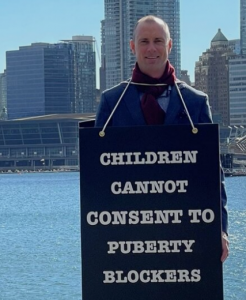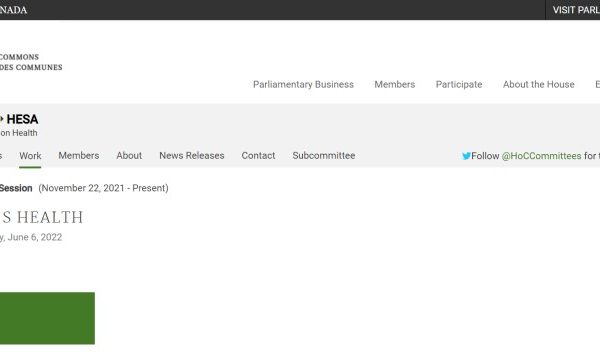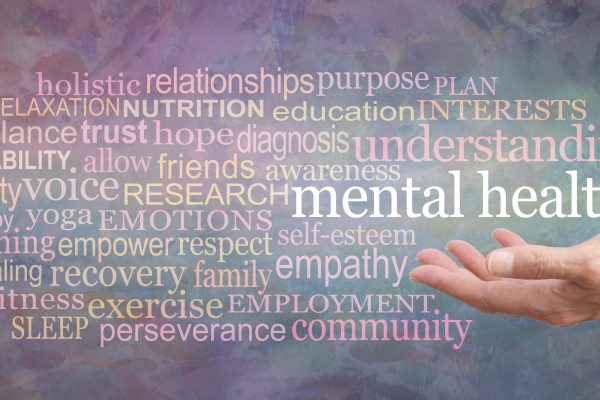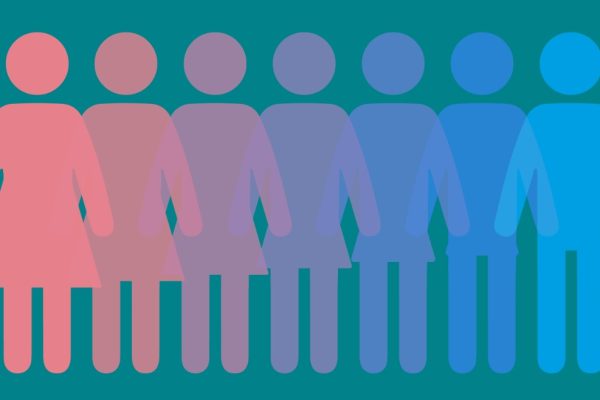For the past year, Chris Elston, aka @BillboardChris, has been taking to the streets of Canada to protest gender ideology in schools and the increasingly discredited practice of medically transitioning children. This week, when he protested across the street from several public schools in Ottawa, he was assaulted and met with a counterprotest that was well organized and attended by Ottawa councilor Catherine McKenney, MPP Joel Harden, and several news outlets. The Ottawa Citizen, CTV News, and the CBC reported on the counter-protests. We’ll let readers assess just how balanced those media reports were for themselves.

Counter-protestors said Chris’s presence in their neighbourhood wearing this billboard was “anti-trans” and quickly mobilized to shut down any conversations that could be had.
But the fact remains; an exponentially growing number of children in Canada are being prescribed puberty blockers and cross-sex hormones under a poorly understood treatment model being called “affirming care”.
Billboard Chris was wearing a sign that read “Children cannot consent to puberty blockers,” which encompasses the two critical aspects of what is becoming coined “affirming gender healthcare” in Canada. Let’s break that down:
What is current gender healthcare for Canadian children?
First, let’s examine the off-label use of puberty blockers and/or cross-sex hormones. Puberty blockers are administered as early as Tanner stage 2 of puberty – essentially when the first signs of reproductive organ development become visible: breast development in girls, hair growth and larger penile growth in boys. This can start at ages 9-14.
A recent gender healthcare screening tool developed by TransCare BC suggests the use of puberty blockers should a girl not like getting her period – and this discomfort relates to her “gender”. Parents of gender questioning children have started asking their family doctors to prescribe female-friendly hormones, like the birth control pill, to reduce the severity of their teenaged daughters’ menstrual cycles rather than risk them going to a gender clinic where they will be prescribed more invasive medical interventions.
Cross-sex hormones are being administered to develop opposite sex characteristics and can be administered to adolescents instead of puberty blockers depending on age and the result that the individual wishes to achieve.
Hormonal interventions such as these have never been approved for the purposes of gender transition in Canada. Imported from the Netherlands (hence it being called the Dutch Protocol), their usage is “off-label” which is a fairly common medical practice where physicians begin to use a drug developed for one condition to treat something entirely different.
Many Canadian healthcare provider websites (yes, that would be our universal healthcare system) advertise puberty blockers as a safe way to delay puberty, suggesting that puberty can be restarted if that’s the desire. However, evidence examined in a recent UK court case found that over 99% of children prescribed puberty blockers went on to treatment with cross-sex hormones. In practice, it seems, restarting puberty rarely happens once treatment with puberty blockers begins.
Evidence reviews of the effects of puberty blockers on children who should be going through the natural physical development phase have found severely compromised bone density, possible neurological and cognitive development issues, and the effect of reduced sexual maturity that can lead to sterilization and loss of sexual function and pleasure.
Only a few weeks ago, Dr Marci Bowers, the world-renowned gender surgeon who has created more than 2000 vaginas in her career and was Jazz Jenning’s surgeon (the transgender teen that was the focus of the reality TV show “I am Jazz”), came out as a whistleblower, stating her main concerns about the medicalized model of gender transitioning that we’ve adopted. In particular, that halting natural puberty development can lead to extreme complications that the medical profession is only beginning to understand.
Due to puberty blockade, Jazz Jennings’ penis didn’t develop naturally, so when it was inverted to become a vagina, it was too small and the procedure failed over time. Jazz’s vagina split. And Jazz will likely never experience an orgasm because, well, no one’s quite sure whether any of the tissue needed for that kind of arousal is functional.
Jazz was supposed to be the poster-child for transgender healthcare for children. But the warning from her surgeon (a trans-woman herself who transitioned as an adult) is quite clear: had Jazz transitioned when she was older, her attempt to transform herself physically wouldn’t have meant so many painful and distressing complications.
Given all this uncertainty, one would naturally assume that Canadian physicians would carefully consider who should get puberty blockers and other interventions like this. While this was true in the past, this is no longer an accurate assumption.
A Nanos public opinion poll published earlier this year found that a strong majority of Canadians believe there should be strict requirements prior to a child or young person undergoing medical gender transition. So Canadians will be shocked to learn that the assessment model has changed in Canada to focus on “capacity to consent” rather than determining whether serious medical interventions are in a child’s long-term best interest.
Due to activist pressure and not evidence-based decision making, mental health assessments and traditional “gatekeeping” requirements are being phased out. The professional associations who advocate for medical transitioning of children have adopted a belief system that mental health assessments stigmatize transgender people and that they are in fact a “barrier to care.” While many Canadians may agree that transgender adults seeking gender confirming treatments should be able to access them easily, this “on demand” and “affirming” model of care is being applied to children and youth as well. Identity medicine, it seems, knows no age boundary.
For example, assessments to determine if a child is autistic and might benefit from a different treatment model are non-existent, even though recent Canadian research has uncovered a direct link between autism and gender dysphoria and recommends screening for autism. However, to now suggest that an autistic child might benefit more fully from additional mental health supports while they are going through the natural development phases of growing up and figuring themselves out is not considered “affirming.” Making puberty blockers and other medical interventions available to them on demand is.
This philosophy applies equally to children who have suffered severe trauma, have a history of anxiety and depression, or are struggling with other issues such as being bullied for being gay or having difficulty forming friendships.
The informed consent model offers less dependence on health
Canadian Professional Association of Transgender Health
professionals in a “gate-keeping” role that has been perceived as unnecessarily pathologizing and may
limit access to care.
Further, the medical system in Canada does not track health outcomes of all children who are being prescribed puberty blockers or cross-sex hormones. We don’t know how many children are being treated, how many have stopped treatment and for what reasons, and what their outcomes are.
Sweden has just effectively halted the usage of gender affirming medical interventions in children under age 16 and is developing a register of patients to track outcomes. Responsible nations do this kind of thing to protect the health and welfare of their citizens and improve treatments and knowledge over time.
Can children consent to puberty blockers?
Canada applies an informed consent model for medical gender transitioning of children. A UK court case brought forward by detransitioner Keira Bell highlighted the difficulties with this model.
In the court proceedings, it was determined that the healthcare model being applied to gender-questioning youth is “experimental.” This finding of fact can also apply to Canada given our adoption of the affirming model of care. Further, the gender clinics in the UK were not monitoring health outcomes or following up with patients to determine the medium- and long-term results of treatment (and nor do we in Canada). If the physicians prescribing the drugs do not know the risks or outcomes of the treatment, how is it possible for children to consent to them?
The UK High Court originally ruled that a “best interest” court order needed to be provided prior to referring any child under 16 to a gender clinic in the UK. In a court of appeal, this requirement was overturned. But this doesn’t mean that the essence of the legal landscape didn’t change significantly.
The result of the appeal and court rulings is that the responsibility for treatment now on the physicians’ shoulders.
In other words: children cannot consent to puberty blockers. The adults in the room have to wake up and take responsiblity. In the UK, the physicians will be held responsible should any harm result from their prescribing. The UK has also initiated a significant new lens of caution from a non-partisan, government-initiated National Health Service review of the evidence behind such treatments.
A new level of safeguarding and legal recourse has been created in the UK to protect children against unnecessary medical interventions. While not a “ban” on puberty blockers, it’s expected that new models of care including psychotherapy and more mental health supports for trans-identified youth will become the norm. Further, parents have been armed with the right to seek a second opinion and will be able to hold physicians to account should a child be medically transitioned without their consent and long-term harm results.
The power imbalance of physicians applying an experimental medical model to children with potential for life-altering harm has been somewhat restored to ensure children and young people can be protected within an appropriate legal framework.
The landscape in Canada is much different. Children are expected to “know who they are” and can therefore make medical decisions for themselves that may have life-changing consequences. The assessments that are in place in Canadian youth gender clinics are solely for the purposes of determining a child’s “capacity to consent.” For instance, SickKids Hospital in Toronto refers to the process as one guided by a child’s self-determined gender goals.
Another concern with this model is, in order for consent to be valid, it must be informed. The principles of informed consent rest on being provided with information about the risks, benefits, and available alternatives for treatment. Are children being provided with any alternatives to medicalization in Canada? No.
Mental health supports are not considered an alternative to manage feelings of gender dysphoria or disentangle those feelings from other issues, such as anxiety, depression, ADHD, and eating disorders. New research on detransitioners found overwhelmingly that mental health services were not offered as an alternative to medicalization even when they had been diagnosed with at least one psychiatric or neurodevelopmental issue or had experienced trauma prior to the onset of gender dysphoria.
In Lisa Littman’s latest research on detransitioners, the majority of participants (65%) reported that their clinicians did not evaluate whether their desire to transition was secondary to trauma or a mental health condition. Only 27% reported that the counseling and information they received prior to transition was accurate in terms of the benefits and risks associated with transition, with nearly half (46%) reporting that the counseling was overly positive about the benefits of transition. Some participants even reported that mental health and medical clinicians pressured them to medically transition.
In Canada, a child’s “gender journey” includes being asked to bear the full responsibility of consenting to experimental medical treatment, which may include never having children or an orgasm during the entirety of the rest of their lives. In our rush to validate and support trans-identifying young people, we’ve over rotated and have forgotten that children go through many developmental phases, not the least of which is puberty itself.
But – Trans rights are human rights!
This is what the counter-protesters chanted as they overwhelmed Chris Elston and his billboard message by more than 100:1. Canadians have become very protective of the vulnerable and we don’t disagree that children and young people are vulnerable for a variety of reasons.
Chris says all he wants to do is have conversations. The counter-protesters, including our elected representatives, made it quite clear that they consider those conversations extremely threatening and not welcome. Media video clips captured the mob descending on Chris and his few supporters. Their articles barely reported on what Chris was doing and saying and why.
Chris and the counter-protestors have one thing in common: They all want to make sure that vulnerable kids are safe and protected from the harm that can come from adults who are pushing their own agenda.
The future of a generation of Canadian children is at stake: Does this not deserve a more thoughtful conversation?





What will the social justice warrior mom tell her adult transitioned child who deeply regrets the mutilating surgeries they went through when both know there’s no recovering what was cut away? What will the apostate churches that promoted the madness (and the cowardly churches that keep silent) say to the society they were called to serve with the truth of the Gospel when people ask; ‘Why didn’t you warn us that all would fall apart?’ What will the public school officials and the social justice warrior teachers say to parents and the causalities of their misbegotten Gender Ideology Theories when they realize they have been misled? What will the doctors who championed these mutilating surgeries and poisonous hormone regimes say? A bitter harvest is coming to maturity! https://scrapbookwithtony.wordpress.com/2020/03/09/a-bitter-harvest-is-coming/
This indoctrination is everywhere. Even news articles here are extremely biased- this social justice movement has people completely taken over in lies. And for those who are in sanity – we are the ones targeted as not being “safe”.
Gaslighting and psychological manipulation, marketing tactics – desensitization. A deep rooted and extremely perverse agenda targeting children and creating “allies” with majority of society. Children exposed to perversions, laws to protect perpetrators and exploit children- Depravity. Celebrating dysphoria and confusion over tackling human trafficking, child sexual exploitation, and abuse. For ill gain is this charade and child body hackers. Anything goes when a nation throws foundational truth out the window. Foundational truth our nation was built upon. Completely dismantled like the youth of our country.